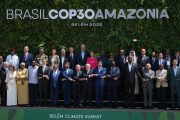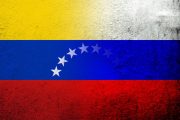Venezuelan dictator Nicolás Maduro sent his vice president, Delcy Rodriguez, to Moscow last week to see if she could arrange some more financing for Maduro’s failing and cash-starved Marxist regime. She came away with warm words but no cash. Russian president Putin was just too busy to see her and handed her off to Foreign Minister Sergei Lavrov, who told her: “We think the best way to help the Venezuelans is to expand practical, pragmatic, and mutual advantageous cooperation.”
Translation: Since you have nothing to bargain with, and since we’re greatly concerned about the return of the $17 billion that we spent propping up your regime, we’re not going to throw good Russian roubles after bad. Have a nice day.
In case that wasn’t clear enough, Kremlin spokesman Dmitry Peskov said: “We hope our Venezuelan partners sort out as soon as possible the difficulties, both domestic political and, of course, economic, difficulties, that are currently taking place in the country.”
Fyodor Lukyanov, head of Russia’s Council on Foreign and Defense Policy, has long since written off the Maduro regime, saying that they will not dispatch military forces to support it because “the probability is high that it won’t end as we would wish.”
Seeing the opening, Secretary of State Mike Pompeo on Saturday called Lavrov to arrange a meeting to talk about Venezuela. Lavrov issued a statement saying that “Russia is ready to participate in this.”
This comes on top of the defection of China from Maduro’s camp as reported last month by The New American:
China’s Commerce Ministry reported on January 29, “If the opposition party [Guaidó] holds power in the future, a new Venezuelan government could use ‘protecting national interests’ as a reason to renegotiate contract terms with China [or] even just refuse to repay remaining debts.
That concern is vastly greater than the $17 billion Maduro owes Russia: China has “invested” some $70 billion there, and is now holding “debt renegotiations” with Guaidó’s representatives in Washington. The results of those negotiations haven’t yet been reported.
Patrick Duddy, who served two stints as U.S. Ambassador to Venezuela (one under President George W. Bush; the other under President Obama) before he was twice expelled, wrote an op-ed for The Hill last week giving his views of the rolling catastrophe taking place there. He lamented that “while Venezuela has become essentially a failed state held together by force, with assistance from China, Russia and Cuba, neither the international community nor the democratic opposition [Guaidó et al.] has managed to dislodge Maduro or convince him to change direction.”
With China and Russia disappearing into the woodwork, that leaves Cuba as the remaining support mechanism keeping the Maduro regime from toppling. So-called “colectivo” gangs are the sharp end of the spear Maduro is using, with Cuban assistance, weaponry, and training, to keep his people in line. Human Rights Watch describes the motorcycle thugs as “gangs who use violence with impunity” while Breitbart explains, “Colectivos have long formed an essential part of the Chavistas strategy, using violence and intimidation to control impoverished communities and ensure their loyalty to the regime.”
Some of their crimes include attacking opposition lawmakers, storming and shutting down services at Catholic Churches, harassing journalists, and generally demanding loyalty from those dependent on government rationing for survival.
Those gangs are no doubt on the lookout for the return of Juan Guaidó, who left the country a week ago to round up additional support from neighboring governments in his quest to replace Maduro. He visited Brazil, Argentina, Paraguay, and Ecuador and announced that he would be returning home on Sunday. But Guaidó violated a ban imposed on him by Maduro’s packed supreme court when he left, and Maduro’s colectivos will only be too glad to find and arrest him upon his return.
That would trigger all manner of repercussions, including possibly exercising the military option that the Trump administration has threatened to use if Maduro’s people cause Guaidó or his family any harm.
If Guaidó arrives safely, he will likely appear again in public on Monday and Tuesday heading up more protests against Maduro and setting the stage for another potential confrontation that could lead ultimately to the exercise of that military option.
Maduro is certainly running out of his own options in trying to keep his teetering regime upright.
Photo: AP Images
An Ivy League graduate and former investment advisor, Bob is a regular contributor to The New American and writes primarily on economics and politics. He can be reached at [email protected].
Related articles:
Once Marxist Maduro Is Gone, Communist Cuba Is Next
U.S. Sends Aid to Venezuela While Cuba Keeps Maduro in Power
Maduro Closes the Door to Aid; His Military Kill Eight, Wound Hundreds
China Holds “Debt Renegotiation” Talks With Maduro’s Opponent




